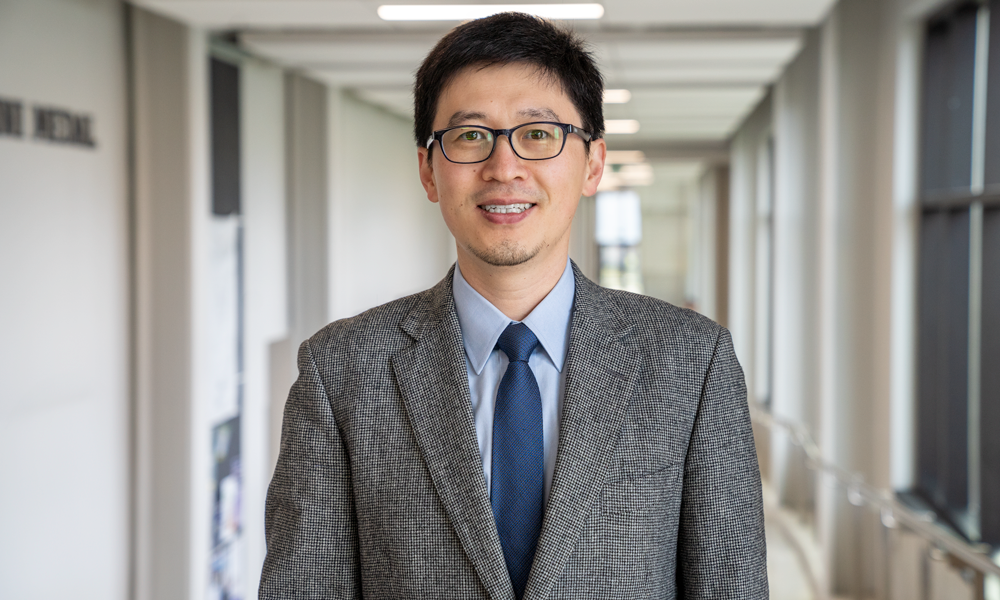Media
Contact
Communications Specialist
Faculty of Engineering
Spencer Engineering Building
Room 2072
Western University
Tel: 519-661-2111 ext. 87015
Email: engineeringcomms@uwo.ca
Min Xia awarded Wolfe-Western Fellowship for pioneering battery repurposing research

Min Xia, the 2025 Wolfe-Western Fellowship award winner. (Jake Arts/Western Engineering)
Min Xia, a professor in Western University’s Faculty of Engineering, has been awarded the Wolfe-Western Fellowship At-Large for his groundbreaking research on repurposing retired lithium-ion batteries from electric vehicles (EVs) into sustainable energy storage systems.
Xia, who joined the department of mechanical and materials engineering in July 2023, is internationally recognized for his work in scientific machine learning and its applications in smart manufacturing and renewable energy systems. His research bridges theoretical innovation with real-world impact, advancing the reliability and sustainability of industrial technologies.
The Wolfe-Western Fellowship is designed to support exceptional scholars in the early stages of their Western appointments—whether assistant, associate or full professors—who demonstrate outstanding leadership and potential in their fields.
Awarded on a competitive basis through faculty nomination, the fellowship recognizes individuals whose research achievements and innovative contributions have already made a significant impact in Canada and internationally, relative to their career stage.
“This fellowship is both an honour and a responsibility," says Xia. "It affirms the importance of creating sustainable energy solutions by repurposing EV batteries, and it inspires me and my team to push further in developing smart, data-driven systems that address global environmental challenges."
"Western’s support has been instrumental in transforming ambitious ideas into impactful technologies,” he added.
Xia’s selection highlights the transformative potential of his current project, which addresses one of the most pressing challenges in the clean energy transition: what to do with the growing number of used EV batteries.
Although no longer suitable for powering vehicles, these retired lithium-ion batteries (RLiBs) typically retain 70 to 80 per cent of their original capacity. Rather than recycling them—a process that can be costly and environmentally taxing—Xia proposes a more sustainable solution: repurposing them for stationary energy storage.
His research focuses on using artificial intelligence (AI) and simulation technologies to overcome three major challenges in repurposing RLiBs: assessing battery health, managing inconsistencies within battery packs and determining optimal locations for energy storage stations.
To address these, Xia is developing a digital twin model—a virtual simulation that can predict a battery’s health and lifespan without the need for expensive physical testing. This innovation could significantly reduce the cost and time required to evaluate used batteries.
He is also creating physics-informed AI models that combine battery science with machine learning to monitor individual cells within a battery pack. This approach enhances safety and performance by identifying and managing inconsistencies in how cells degrade over time.
Finally, Xia’s team is designing an optimization model to guide the placement of energy storage stations. The model considers factors such as electricity demand, renewable energy availability, transportation costs, and environmental impact.
The potential benefits of this research are far-reaching. By enabling the cost-effective reuse of RLiBs, Xia’s work supports the growth of renewable energy, reduces battery waste and helps Canada advance toward its carbon neutrality goals. It also positions Western as a leader in clean energy innovation.
Xia’s research has already attracted significant attention. He has authored more than 80 peer-reviewed papers, received multiple international awards, and secured over $20 million in research funding.
As the world grapples with the environmental consequences of electrification, Xia’s vision offers a promising path forward—one where yesterday’s batteries power tomorrow’s clean energy future.

